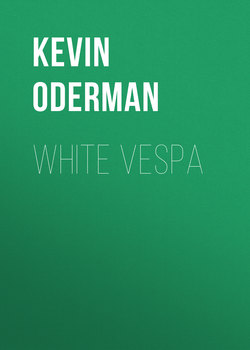Читать книгу White Vespa - Kevin Oderman - Страница 20
На сайте Литреса книга снята с продажи.
ОглавлениеTwelve
14 Sept.
Yesterday I hiked the trail straight down, into the caldera. Or what I took for a trail; I soon lost it in a maze of overgrown terraces and goat paths. The descent is abrupt, a foot down for every foot forward, but broken by terraces sometimes higher than they are wide. Not built by anybody planning to leave them behind. The terraces are so thick in olives, figs, and thorns that once I got off the lip of the caldera the floor of the crater below was rarely visible. Untended. Maybe not the people who built them, but somebody sure as hell left them behind. Fleeing from or running to, it’s come to seem to me that it hardly matters which. You arrive at a place you don’t understand and won’t understand ever as the locals do. It’s less constructed—for you—than the place you left, less encumbered. The rocks themselves seem less encumbered, as if gravity had given way; everything wants to float up. Only what it is, the new place shines, as if eternal. And for you it is. It has no history, no future, it’s only there for you as you walk by it, forever just so. If you keep on walking.
A camera works a similar magic. There’s more to the link between photography and travel than just having an album of snaps to show the boys back home, the proof. Photos rise up out of reality, things forever fixed. The photograph may yellow or rot, but the world within it lies in a dumb trance from which there is no waking. That moment and eternity pull together. And yet, tourists arrange their photos in albums, in stories, and read their guidebooks, “for context,” “the historical context,” to keep creeping eternity from dissolving their stories altogether, into a kind of rapture. They guard carefully against the very thing that called to them, set them traveling to begin with. But not me, no not me, I wanted the rapture, I wanted it bad.
When I broke out of the brush, the path was clearly a path and led directly to a road. Soon I was walking on blacktop, striding along, and the floor of the crater came up on the left, flat and barren and the smell of sulfur very loud. I stepped off the blacktop and suddenly wherever I walked there was a path. The place was riddled with paths, and I kept on, heading for the crater within the crater, the very throat of the volcano. I walked right down into it. Sulfur. Dust. The heat, the smell nearly dropped me.
I walked in the silence of the crater, walked home in a silence so deep I could hardly wade through it. The crows took a friendly interest in my progress, watching to see if I’d make it. Heat waves. A watery mirage always receding before me. I stayed on the blacktop the whole way, the long way, but free of briars. When I got back here I took a small, round watermelon up on the roof, a knife and a spoon, and ate the entire thing looking down into the volcano. I watched the early shadows push out from the crater walls in the west and spread like a tide across the floor, then climb the eastern walls, until they pushed the last of the light off the lip and up into the sky. The sky got orange and color spread back, and then all that was left of the sun’s light succumbed in the west. A few small lights flickered to life in Emborió, and across the crater, in Nikiá, quite a few more. The way a day ends. I carried a mattress up onto the roof and a couple of blankets, lit a mosquito coil, and settled in to watch the stars wheel westward.
